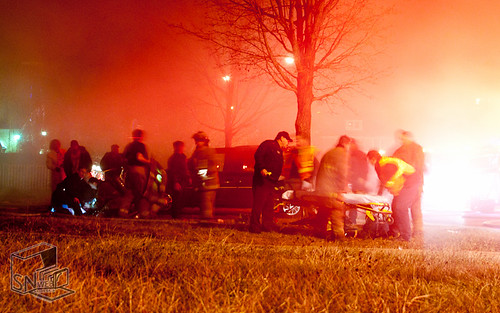I never met Neibi Brito. And, despite passing it almost daily, I never saw her children playing in the yard of the house in which they lived. I would have noticed. It was a great house, cottage-like and quaint, a small-scale Cape Cod . Someone painted the exterior powder blue. Had I been consulted, powder blue would not have been among my first choices but, accented by white trim, it worked.
My subdivision sits just a block off the main thoroughfare which acts as a sort of suburban life-line. It’s the way I get to the market. It takes me to my son’s school. If I follow it one way, it takes me downtown. The other way takes me to the highway and, from there, I can go anywhere. My house sits on one side of this road and what’s left of Neibi Brito’s powder blue cottage sits, smoldering, on the other.
On Thursday evening, my friend’s teenage daughter reported seeing Neibi running around her front yard. She was screaming and waving her hands. One of her neighbors later explained she was screaming “My babies!”.
A construction worker, drawn by the commotion, stopped and went into action unloading a ladder from the back of his truck. At times like these, communication barriers are of no consequence. Desperation is a universal language.
Seeing the construction worker leaning his ladder against the side of the house, two nineteen-year-old neighbors offered their assistance. By now, flames licked the outer edges of the front window frame, and black smoke billowed towards a street filling with onlookers and distracted rush hour motorists.
The men worked as a team to remove three children from a second story bedroom, through a window, down the ladder, to the ground where it was confirmed that three-year-old Ivan Guevara had died. His four-year-old brother, Isaac Guevara, and eighteen-month-old sister, Stacy Brito, immediately began receiving treatment from paramedics who had arrived on the scene minutes before. They arrived alongside firemen, whose boots flattened the garden hose Ivan Gonzalez had grabbed in hopes of squelching the flames without the assistance of emergency personnel. The last thing Ivan Gonzalez wanted to see was men wearing boots and badges.
As the children were loaded into waiting ambulances, Ivan stood attentive, just outside the vehicle’s gaping back end. The right side of his face oozed anew as soon as he removed the soiled rag with which he dabbed at it. He was missing an eyebrow. He relayed, to the paramedics, his intention to follow the ambulance to the hospital. It was a request made by most fathers; fathers who made awkward attempts at smoothing hair while crooning their children safely inside the emergency room.
Ivan did neither.
Ivan never showed up.
Ivan wasn’t their father.
Ivan was their mother’s boyfriend.
Twenty-six-year-old Ivan Gonzalez was a chemist,
a chemist who cooked methamphetamines,
a chemist who cooked methamphetamines which were later sold by his girlfriend, their mother, twenty-two-year-old Neibi Brito.
And that explains a lot.
That explains the fire.
That explains the $193,000.00 stashed between two slabs of drywall which explains how, despite appearing unemployed, they paid rent for a home in an area that demands anywhere between $1, 200.00 and $700,000.00 per month.
That explains what one neighbor dubbed “unusual activity” at their home.
Tragic as it is, that even explains the “signs of child cruelty” reported in the local newspaper.
What it doesn’t explain is the question the rest of us keep asking, “How could THAT have happened HERE, in THIS neighborhood?”
The question is asked in shock at the realization that our triple digit incomes don’t provide immunity from a “certain element”, which is a good Southern girl’s way of describing illegal immigrants, criminals, drug dealers, child abusers, or any other unsavory individual, or group of individuals, from which we hope to protect ourselves by ensconcing our families inside gated communities, which offer the privilege of being able to touch the house next to yours by simply extending an arm from an upper level window.
Anyone who looked at Neibi Brito, particularly as she wheeled her 2011 Cadillac into her rented driveway, knew she didn’t belong. She was twenty-two. She had three children under the age of five. She lived with a man who was not her children’s father, and neither of them left the house everyday at the same time and returned at a different same time. There was no visible means of support.
I’m not here to point fingers. There’s plenty of blame to go around; from the real estate agent, to the car dealer, to the neighbor so eager to share her suspicions of “unusual activity” on the 6:00 news. Ivan Gonzalez had been arrested just days before as an accessory to a child stabbing case. We could go there. But we won’t.
Three children died, and it doesn’t matter whose fault it was. They’re still dead. What matters is that next time something doesn’t fit, we ask the questions, we be the "buttinsky", we care.
Suppose a neighbor had shown up on Neibi Brito’s doorstep on moving day? Suppose she carried a basket of muffins, and when Neibi answered the bell, she handed her the muffins and took time to speak to each of the three children pulling at Neibi’s legs? What if she came back, with her daughter in tow, the next day? What if she offered to take the children for a walk, while Neibi had some much needed alone time?
Would a drug dealer have set up a meth lab in Gladys Kravitz’s neighborhood?
Sometimes caring really is a matter of life and death.
© Copyright 2007-2011 Stacye Carroll All Rights Reserved






1 comment:
a candle burns for the angels that left us so soon, i can not judge, but thank you for this article...maybe it will inspire someone else walking in the darkness for money...
rest in peace angels...
Post a Comment